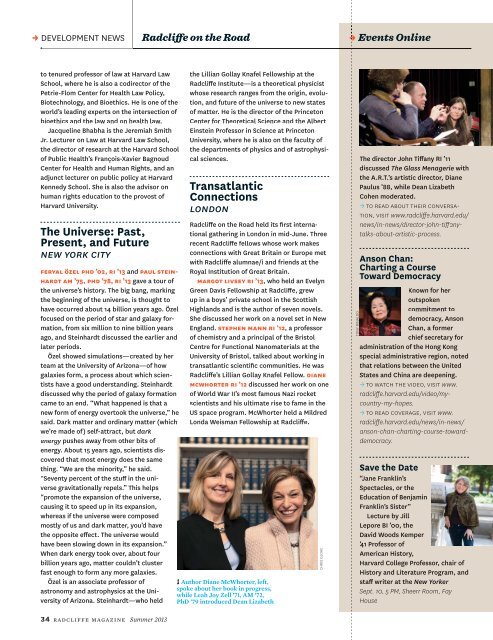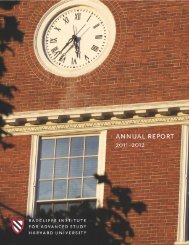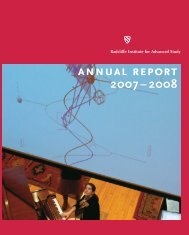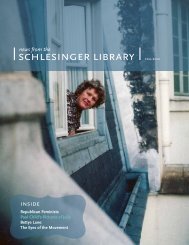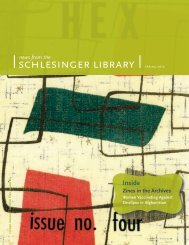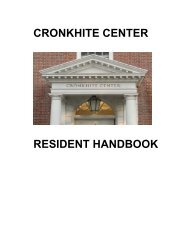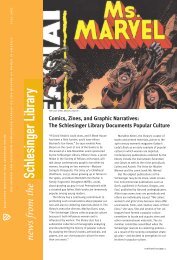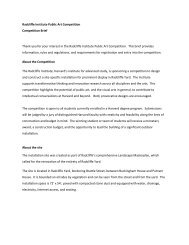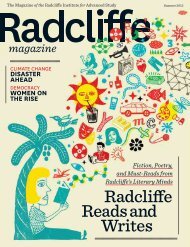Download - Radcliffe Institute for Advanced Study - Harvard University
Download - Radcliffe Institute for Advanced Study - Harvard University
Download - Radcliffe Institute for Advanced Study - Harvard University
You also want an ePaper? Increase the reach of your titles
YUMPU automatically turns print PDFs into web optimized ePapers that Google loves.
V DEVELOPMENT NEWS <strong>Radcliffe</strong> on the Road V Events Online<br />
to tenured professor of law at <strong>Harvard</strong> Law<br />
School, where he is also a codirector of the<br />
Petrie-Flom Center <strong>for</strong> Health Law Policy,<br />
Biotechnology, and Bioethics. He is one of the<br />
world’s leading experts on the intersection of<br />
bioethics and the law and on health law.<br />
Jacqueline Bhabha is the Jeremiah Smith<br />
Jr. Lecturer on Law at <strong>Harvard</strong> Law School,<br />
the director of research at the <strong>Harvard</strong> School<br />
of Public Health’s François-Xavier Bagnoud<br />
Center <strong>for</strong> Health and Human Rights, and an<br />
adjunct lecturer on public policy at <strong>Harvard</strong><br />
Kennedy School. She is also the advisor on<br />
human rights education to the provost of<br />
<strong>Harvard</strong> <strong>University</strong>.<br />
The Universe: Past,<br />
Present, and Future<br />
new york city<br />
feryal özel phd ’02, ri ’13 and paul steinhardt<br />
am ’75, phd ’78, ri ’13 gave a tour of<br />
the universe’s history. The big bang, marking<br />
the beginning of the universe, is thought to<br />
have occurred about 14 billion years ago. Özel<br />
focused on the period of star and galaxy <strong>for</strong>mation,<br />
from six million to nine billion years<br />
ago, and Steinhardt discussed the earlier and<br />
later periods.<br />
Özel showed simulations—created by her<br />
team at the <strong>University</strong> of Arizona—of how<br />
galaxies <strong>for</strong>m, a process about which scientists<br />
have a good understanding. Steinhardt<br />
discussed why the period of galaxy <strong>for</strong>mation<br />
came to an end. “What happened is that a<br />
new <strong>for</strong>m of energy overtook the universe,” he<br />
said. Dark matter and ordinary matter (which<br />
we’re made of) self-attract, but dark<br />
energy pushes away from other bits of<br />
energy. About 15 years ago, scientists discovered<br />
that most energy does the same<br />
thing. “We are the minority,” he said.<br />
“Seventy percent of the stuff in the uni-<br />
verse gravitationally repels.” This helps<br />
“promote the expansion of the universe,<br />
causing it to speed up in its expansion,<br />
whereas if the universe were composed<br />
mostly of us and dark matter, you’d have<br />
the opposite effect. The universe would<br />
have been slowing down in its expansion.”<br />
When dark energy took over, about four<br />
billion years ago, matter couldn’t cluster<br />
fast enough to <strong>for</strong>m any more galaxies.<br />
Özel is an associate professor of<br />
astronomy and astrophysics at the <strong>University</strong><br />
of Arizona. Steinhardt—who held<br />
the Lillian Gollay Knafel Fellowship at the<br />
<strong>Radcliffe</strong> <strong>Institute</strong>—is a theoretical physicist<br />
whose research ranges from the origin, evolution,<br />
and future of the universe to new states<br />
of matter. He is the director of the Princeton<br />
Center <strong>for</strong> Theoretical Science and the Albert<br />
Einstein Professor in Science at Princeton<br />
<strong>University</strong>, where he is also on the faculty of<br />
the departments of physics and of astrophysical<br />
sciences.<br />
Transatlantic<br />
Connections<br />
london<br />
<strong>Radcliffe</strong> on the Road held its fi<br />
rst interna-<br />
tional gathering in London in mid-June. Three<br />
recent <strong>Radcliffe</strong> fellows whose work makes<br />
connections with Great Britain or Europe met<br />
with <strong>Radcliffe</strong> alumnae/i and friends at the<br />
Royal Institution of Great Britain.<br />
margot livsey ri ’13, who held an Evelyn<br />
Green Davis Fellowship at <strong>Radcliffe</strong>, grew<br />
up in a boys’ private school in the Scottish<br />
Highlands and is the author of seven novels.<br />
She discussed her work on a novel set in New<br />
England. stephen mann ri ’12, a professor<br />
of chemistry and a principal of the Bristol<br />
Centre <strong>for</strong> Functional Nanomaterials at the<br />
<strong>University</strong> of Bristol, talked about working in<br />
transatlantic scientific communities. He was<br />
<strong>Radcliffe</strong>’s Lillian Gollay Knafel Fellow. diane<br />
mcwhorter ri ’12 discussed her work on one<br />
of World War II’s most famous Nazi rocket<br />
scientists and his ultimate rise to fame in the<br />
US space program. McWhorter held a Mildred<br />
Londa Weisman Fellowship at <strong>Radcliffe</strong>.<br />
3 Author Diane McWhorter, left,<br />
spoke about her book in progress,<br />
while Leah Joy Zell ’71, AM ’72,<br />
PhD ’79 introduced Dean Lizabeth<br />
CHRIS GLOAG<br />
Anson Chan:<br />
Charting a Course<br />
Toward Democracy<br />
The director John Tiffany RI ’11<br />
discussed The Glass Menagerie with<br />
the A.R.T.’s artistic director, Diane<br />
Paulus ’88, while Dean Lizabeth<br />
Cohen moderated.<br />
→ to read about their conversation,<br />
visit www.radcliffe.harvard.edu/<br />
news/in-news/director-john-tiffany-<br />
talks-about-artistic-process.<br />
Known <strong>for</strong> her<br />
outspoken<br />
commitment to<br />
democracy, Anson<br />
Chan, a <strong>for</strong>mer<br />
chief secretary <strong>for</strong><br />
administration of the Hong Kong<br />
special administrative region, noted<br />
that relations between the United<br />
States and China are deepening.<br />
→ to watch the video, visit www.<br />
radcliffe.harvard.edu/video/my-<br />
country-my-hopes.<br />
→ to read coverage, visit www.<br />
radcliffe.harvard.edu/news/in-news/<br />
anson-chan-charting-course-towarddemocracy.<br />
TONY RINALDO<br />
Save the Date<br />
“Jane Franklin’s<br />
Spectacles, or the<br />
Education of Benjamin<br />
Franklin’s Sister”<br />
Lecture by Jill<br />
Lepore BI ’00, the<br />
David Woods Kemper<br />
’41 Professor of<br />
American History,<br />
<strong>Harvard</strong> College Professor, chair of<br />
History and Literature Program, and<br />
staff writer at the New Yorker<br />
Sept. 10, 5 PM, Sheerr Room, Fay<br />
House<br />
34 radcliffe magazine Summer 2013


